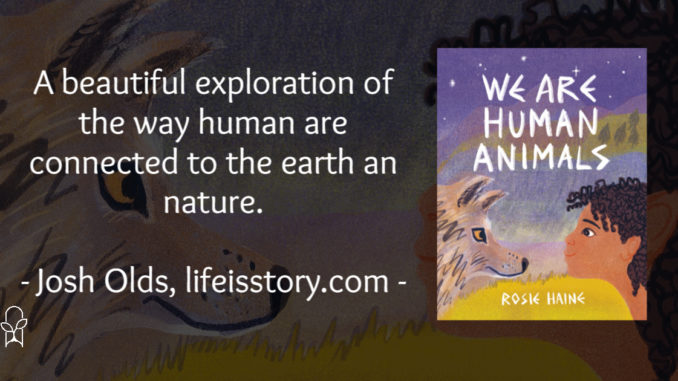
Published by Eerdmans Books for Young Readers on March 7, 2023
Genres: Children's
Buy on Amazon
Goodreads

A resonant reflection on what it means to be human, in the prehistoric past and today.
Since the early days of our history, we have been human animals. Thousands of years ago, in paleolithic times, we got up with the sun each morning. The seasons were our calendar, and everything we ate we picked or caught. Some animals were our friends, and others were our food. We loved to meet and talk and dance and wonder at our world. Centuries and centuries have passed since then. But—even though our world is very different now—we are still human animals like the people before us.
With simple, poetic words and evocative illustrations, this book transports readers to the strangely familiar Stone Age, when our ancestors were shaping what Homo sapiens would become. We Are Human Animals will spark unforgettable discussions about the history of humanity and the ties that bind us to those who walked the earth long ago.
We Are Human Animals is an exploration of the way humans are connected to the earth. With beautiful illustrations as her backdrop, author/illustrator Rosie Haine takes readers back thousands of years to a time when humans, animals, the earth were in much greater connection. We knew our world so well, one panel states in both awe and lament. Haine also draws parallels to the modern age: We played music. We had clothes. We wore jewelry. We made art. She manages to show how humanity has changed and how it has remained the same, all while calling us to remember our earthy roots.
In the author’s note at the end of We Are Human Animals, Haine writes, “Human nature comes from our place in nature—we may have airplanes, mobile phones, and space travel now, but our emotions, bodies, and minds were designed for this earlier time.” I think quite we look back on the past—even the recent past—with horror at the technologies we did not have: the internet, indoor plumbing, motor vehicles, and so on. But We Are Human Animals looks back on the ancient past—a past, it is worth noting, still preserved by some indigenous cultures throughout the world—with a fondness and willingness to suggest that maybe we’ve lost, not just some of our animal-ness but our human-ness as well.
Haine’s illustrations are captivating. I will make note that a couple of nude figures are portrayed, one with genitals displayed. It’s not something that the book calls attention to, nor is it sexual in any way, and I hesitate bringing it up except in this particular cultural moment it is an important element for school librarians to be aware of. (Haine has also written/illustrated a book called It Isn’t Rude to be Nude, if you want to know her thoughts on the matter.)
Overall, We are Human Animals is meant to show readers the life that is isn’t always the life that was and provide us with some connection to our ancestors and the earth and its creatures. It raises some excellent points for discussion, particularly for older elementary kids—allowing them to discuss what they agree with and what they disagree with, what connections they see to their past and to the animal kingdom, and where they feel modern humans are different. It’s a conversational piece, for sure, and one that starts the conversation thoughtfully.
